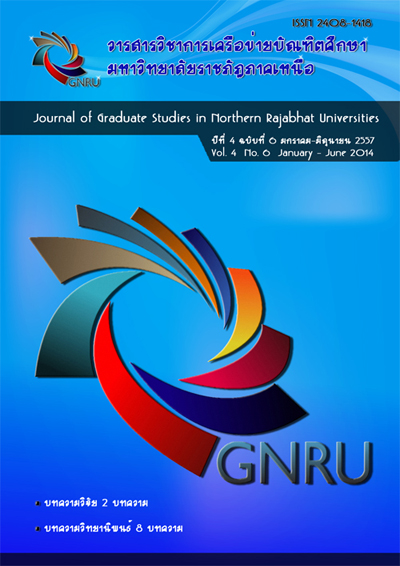ผลการจัดประสบการณ์โดยใช้เกมเชิงคณิตศาสตร์ที่มีต่อความสามารถพื้นฐานทางคณิตศาสตร์ ของเด็กปฐมวัย; The Effects of Educational Experience by Using Mathematical Games on the Basics Mathematics Ability of Early Childhood
Main Article Content
Abstract
บทคัดย่อ
การวิจัยครั้งนี้มีวัตถุประสงค์ดังนี้ 1) เพื่อเปรียบเทียบจานวนของเด็กปฐมวัยที่มีคะแนนความสามารถพื้นฐานทางคณิตศาสตร์หลังได้รับการจัดประสบการณ์โดยใช้เกมเชิงคณิตศาสตร์ผ่านเกณฑ์ร้อยละ 70 ของคะแนนเต็มกับเกณฑ์ร้อยละ 70 และ 2) เพื่อเปรียบเทียบความสามารถพื้นฐานทางคณิตศาสตร์ก่อนเรียนและหลังเรียนที่ได้รับการสอนโดยการจัดประสบการณ์เกมการศึกษา กลุ่มตัวอย่างที่ใช้ในการวิจัยครั้งนี้เป็นนักเรียนชั้นอนุบาลปีที่ 1 โรงเรียนบ้านไร่ดอนแตง ที่กาลังศึกษาอยู่ในภาคเรียนที่ 2 ปีการศึกษา 2556 จานวน 30 คน เครื่องมือที่ใช้ในการวิจัยประกอบด้วย 1) แผนการจัดประสบการณ์โดยใช้เกมเชิงคณิตศาสตร์ 2) แบบทดสอบความสามารถพื้นฐานทางคณิตศาสตร์เป็นแบบปรนัย 3 ตัวเลือก จานวน 30 ข้อ มีค่าความยากง่ายอยู่ระหว่าง 0.40-0.67 มีค่าอานาจจาแนกอยู่ระหว่าง 0.38-0.82 และมีค่าความเที่ยงเท่ากับ 0.82 ผลการวิจัยมีดังนี้
1. เด็กปฐมวัยที่ได้รับการจัดประสบการณ์โดยใช้เกมเชิงคณิตศาสตร์ ร้อยละ 74มีความสามารถพื้นฐานทางคณิตศาสตร์ ผ่านเกณฑ์ร้อยละ 70 ของคะแนนเต็มซึ่งสูงกว่าเกณฑ์ร้อยละ 70 อย่างมีนัยสาคัญทางสถิติที่ระดับ 0.05
2. เด็กปฐมวัยที่ได้รับการจัดประสบการณ์โดยใช้เกมเชิงคณิตศาสตร์มีความสามารถพื้นฐานทางคณิตศาสตร์หลังเรียนสูงกว่าก่อนเรียน อย่างมีนัยสาคัญทางสถิติที่ระดับ .05
Abstract
The purposes of this research were 1) to compare the basic mathematics of early childhood being taught by using mathematical games on the basics mathematics who passed the criterion score of 70 percent with the criterion of 70 percent and 2) compare mathematical games on the basics mathematics before and after being taught by using mathematical games on the basics mathematics.
The samples in this research were 30 in class 1 students of Banraidontang School studying in the second semester of the 2013 academic year.
The research instruments used in the study were 1) plan of the experience management using mathematical games and 2) basics mathematics ability achievement test with 3 choices and 30 items, the degree of difficulty between 0.40 and 0.67, the discrimination power between 0.38 and 0.82 and the reliability coefficient of 0.82.
The findings of this research were
1. 74 percent of all students who were taught by using mathematical games on the basics mathematics achieved higher than the criterion score of the comprehension 70 percent at the 0.05 level of significance.
2. Early childhood taught by using mathematical games on the basics mathematics had the achievement after being taught higher than that before being taught at the .05 level of significance.


